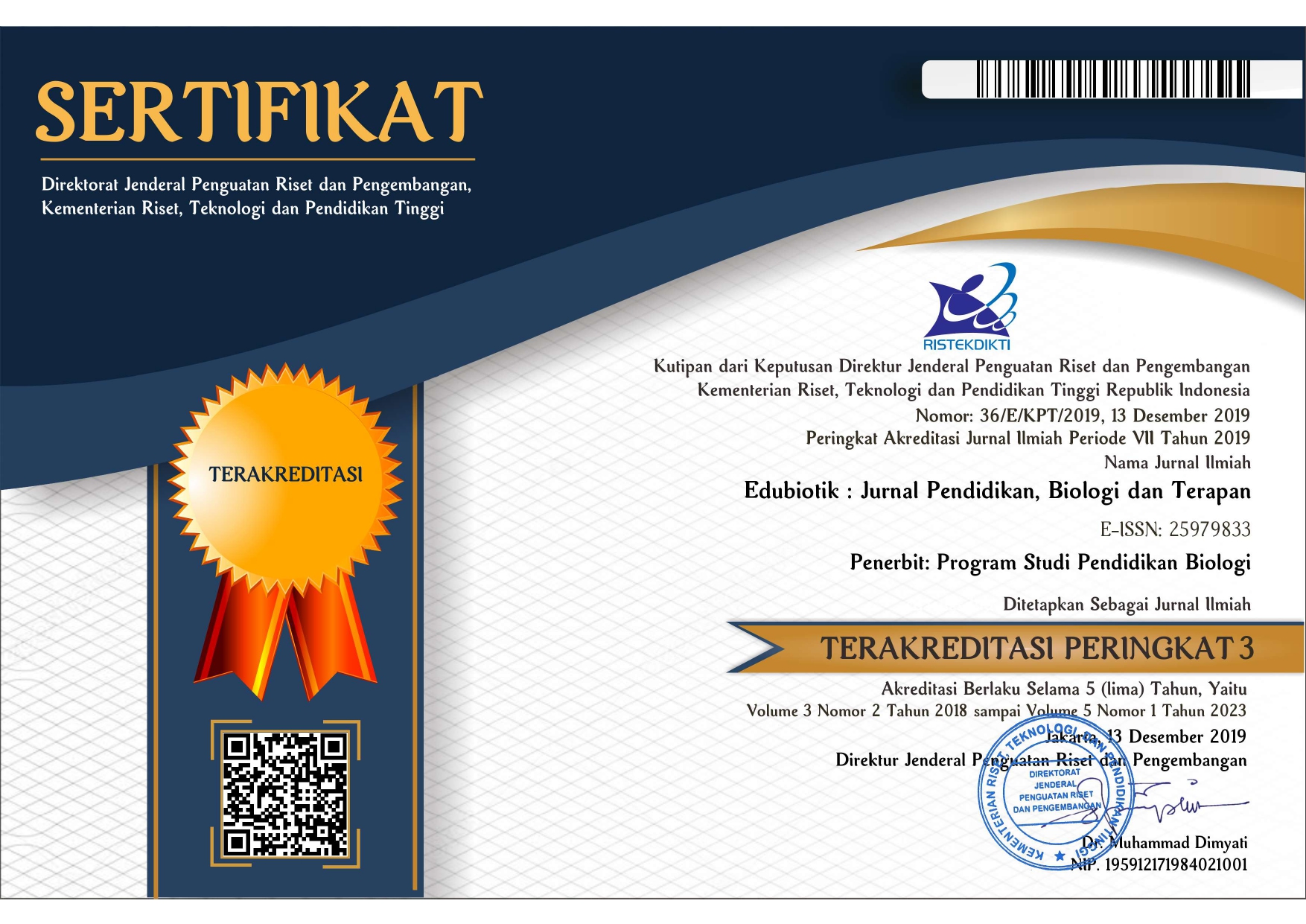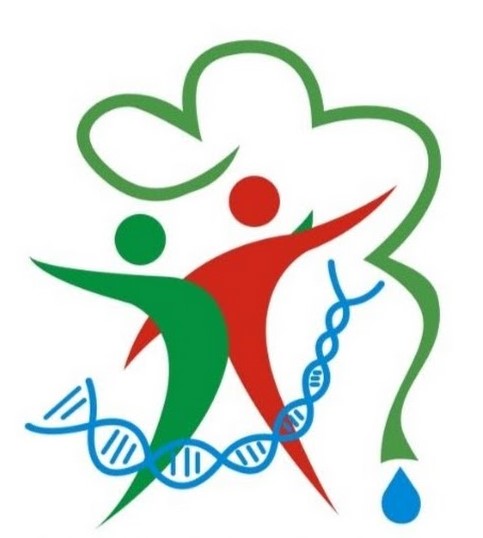The instruments for measuring students’ self-efficacy in biology learning: Validity and reliability
Abstract
Creating a valid and reliable instrument is very necessary to produce a quality and accountable research. A research instrument must also be able to meet the requirements so that what you want to measure can produce accurate data. This study aims to develop a standard and quality instrument for measuring students’ s self-efficacy in Biology learning. The method used in this research is descriptive quantitative with the aim of knowing the quality of the items on the three dimensions of self-efficacy, namely the dimensions of level, strength, and generality, that it can be used to measure the self-efficacy of students in learning biology. The instrument used is a self-efficacy questionnaire consisting of 40 statements. Sample in this research is 20 students in grade XI MIPA SMAN 2 Hiliran Gumanti. The items in instrument analysis test, was conducted by a validator, namely through professional judgment or expert review. The data analysis technique used is the validity test using Pearson's Product Moment analysis and the reliability test using the Chronbach Alpha technique. The results of the study and data analysis showed that the instrument for measuring students' self-efficacy was valid and reliable. So it can be concluded that the research instrument meets the criteria for use in the next analysis, because it can measure students' self-efficacy even though there are several items that must be revised first.
References
Arifin, Z. (2017). Kriteria instrumen dalam suatu penelitian. Jurnal Theorems (the Original Research of Mathematics), 2(1), 28–36. https://core.ac.uk/
Beghetto, R. A., & Karwowski, M. (2017). Toward untangling creative self-beliefs. In The Creative Self: Effect of Beliefs, Self-Efficacy, Mindset, and Identity. https://doi.org/10.1016/B978-0-12-809790-8.00001-7
Dewi, S. K., & Sudaryanto, A. (2020). Validitas dan reliabilitas kuisioner pengetahuan , sikap dan perilaku. Program Studi Keperawatan, Universitas Muhammadiyah Surakarta, 73–79. https://publikasiilmiah.ums.ac.id/bitstream/handle/11617/11
Farah Maulida Nurfitria Alminingtias, Slamet Soro, I. H. (2018). Hubungan self-efficacy dengan hasil belajar matematika siswa di MAN 7 Jakarta. Prosiding Seminar Nasional Pendiddikan Matematika UHAMKA, 01, 365–371. https://journal.uhamka.ac.id/index.php/senamku/article/view/2725
Gunawan, I., Benty, D. D. N., Kusumaningrum, D. E., Sumarsono, R. B., Sari, D. N., Pratiwi, F. D., Ningsih, S. O., & Hui, L. K. (2019). Validitas dan reliabilitas angket keterampilan manajerial mahasiswa. Jurnal Administrasi Dan Manajemen Pendidikan, 2(4), 247–257. https://doi.org/10.17977/um027v2i42019p247
Hardianto, G., Erlamsyah, E., & Nurfahanah, N. (2016). Hubungan antara self-efficacy akademik dengan hasil belajar siswa. Konselor, 3(1), 22. https://doi.org/10.24036/02014312978-0-00
Hayati, M., Rahmi, Y. L., & Sigit, D. V. (2021). Analysis correlation between self-efficacy and competence of biology in senior high school. Jurnal Atrium Pendidikan Biologi, 6(3), 232-237. http://dx.doi.org/10.24036/apb.v6i3.11865
Hoffman, A. J., Von Eye, A., Audrey, G. G., Given, B. A., Given, C. W., & Rothert, M. (2011). The development and testing of an instrument for perceived self-efficacy for fatigue self-management. Cancer Nursing, 34(3), 167.
Mahmudi, M. H., dan Suroso, S. 2014. Efikasi diri, dukungan sosial dan penyesuaian diri dalam belajar. Persona: Jurnal Psikologi Indonesia, 3.02. http://jurnal.untag-sby.ac.id/index.php/persona/article/view/382
Novena, V. V., & Kriswandani, K. (2018). Pengaruh model pembelajaran probing prompting terhadap hasil belajar ditinjau dari self-efficacy. Scholaria: Jurnal Pendidikan Dan Kebudayaan, 8(2), 189–196. https://doi.org/10.24246/j.js.2018.v8.i2.p189-196
O'Neill, S. C., & Stephenson, J. (2011). The measurement of classroom management self‐efficacy: a review of measurement instrument development and influences. Educational Psychology, 31(3), 261-299. https://www.researchgate.net/
Rahman, U. (2013). Efikasi diri, kepuasan kerja, dan organizational citizenship behavior pada guru man di Sulawesi. Lentera Pendidikan : Jurnal Ilmu Tarbiyah Dan Keguruan, 16(1), 1–15. https://doi.org/10.24252/lp.2013v16n1a1
Rosyida, F., Utaya, S., & Budijanto, B. (2016). Pengaruh kebiasaan belajar dan self-efficacy terhadap hasil belajar geografi di SMA. Jurnal Pendidikan Geografi, 21(2), 17–28. https://doi.org/10.17977/um017v21i22016p017
Sari, M. K., Rahmi, Y. L., & Ichsan, I. Z. (2021). Is there a relationship between self-efficacy and student’s biology learning competence?. Jurnal Atrium Pendidikan Biologi, 6(3), 226-231. http://dx.doi.org/10.24036/apb.v6i3.11827
Schmidt, K. M., & Alexander, J. E. (2012). The empirical development of an instrument to measure writerly self-efficacy in writing centers. Journal of writing assessment, 5(1), 1-10. https://escholarship.org/uc/item/5dp4m86t
Slameto. 2013. Belajar dan Faktor-faktor yang Mempengaruhi. Jakarta: Rineka Cipta
Sugiyono. (2013). Metode Penelitian Kuantitatif, Kualitatif, dan Tindakan. Alfabeta.
Suharsono, Y., & Istiqomah. (2014). Validitas dan reliabilitas skala self-efficacy. Jurnal Ilmiah Psikologi Terapan, 2(1), 144–151. http://202.52.52.22/index.php/jipt/article/download/1776/1864
Suwardi, D. R. (2012). Faktor-faktor yang mempengaruhi hasil belajar siswa kompetensi dasar ayat jurnal penyesuaian mata pelajaran akuntansi kelas xi ips di SMA Negeri 1 Bae Kudus. Economic Education Analysis Journal, 1(2). https://journal.unnes.ac.id/sju/index.php/eeaj/article/view/667
Taufik, L. M. (2019). Academic self-efficacy mahasiswa calon guru SD dalam pembelajaran konsep dasar IPA subkonsep biologi. Bio Educatio, 3.1, 1–9. http://dx.doi.org/10.31949/be.v3i1.1006
Widyaninggar, A. A. 2015. Pengaruh efikasi diri dan lokus kendali (locus of control) terhadap prestasi belajar matematika. Formatif: Jurnal Ilmiah Pendidikan MIPA, 4.2. http://dx.doi.org/10.30998/formatif.v4i2.143
Yusup, F. (2018). Uji validitas dan reliabilitas instrumen penelitian kuantitatif. Jurnal Tarbiyah : Jurnal Ilmiah Kependidikan, 7(1), 17–23. https://doi.org/10.18592/tarbiyah.v7i1.2100





.png)
2.png)

1.jpg)


